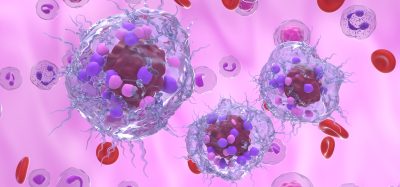Discovery of molecular pathway could target lung cancer
Posted: 1 December 2023 | Drug Target Review | No comments yet
New findings about how RBM10 inhibits lung cancer growth offers potential for an anti-cancer drug and more personalised treatment.


Tulane University researchers have found a previously unknown molecular pathway that may be critical for stopping lung cancer.
Lung cancer is one of the most common cancers and the leading cause of cancer-related deaths in the world. Senior author Dr Hau Lu, the Reynolds and Ryan Families Chair in Translational Cancer at the Tulane University School of Medicine, said that this research may lead to the development of a new anti-cancer drug and more personalised lung cancer treatment.
Tumour suppressor protein
The scientists discovered that RBM10, a known tumour suppressor protein, inhibits lung cancer growth by suppressing the function of c-Myc, a protein that drives cancer cell growth and proliferation when overexpressed. They also found that RBM10 partners with two ribosomal proteins, RPL5 and RPL11, to destabilise c-Myc and block the spread of lung cancer. These findings are the first to identify a cancer-inhibiting relationship between the proteins.
“We found that RBM10 can directly target c-Myc for degradation and reduce its cancer-causing effects by binding with RPL5 and RPL11,” Lu explained. “We know a lot about cancer, but the molecules involved are still a black box. Piece by piece, we are gaining a better understanding.”
C-Myc has a regular role in the protein production process and cellular growth in general, which humans could not live without. Sometimes, this production is disrupted, and the cells begin producing incorrect parts. When cancer starts forming, it uses c-Myc to continue production, allowing these “spare parts” to accumulate and form tumours. RBM10, with the help of RPL5 and RPL11, can destabilise c-Myc and shut down tumour growth.
“RBM10 is an important protein that can suppress cancer cells, but when a cancer wants to develop, it will mutate RBM10 and block that function,”
The research also revealed that a mutant form of RBM10 often found in lung cancers loses the ability to suppress c-Myc, fails to bind to the RPL5 and RPL11 ribosomal proteins, and eventually promotes tumour growth instead of suppressing it.
“RBM10 is an important protein that can suppress cancer cells, but when a cancer wants to develop, it will mutate RBM10 and block that function,” Lu stated.
Lu aims to know how the RBM10 mutant functions in the hope of developing an anti-cancer drug to target it. He said: “Hopefully we can design a molecule to specifically target the mutant, since that’s a special structure not existing in the normal tissue… If we can convert this mutant, we can hopefully make it suppress c-Myc’s cancer-causing activity.”
The study was published in Proceedings of the National Academy of Sciences.
Related topics
Cancer research, Personalised Medicine, Protein
Related conditions
Cancer Research, Lung cancer
Related organisations
Tulane University School of Medicine
Related people
Dr Hau Lu (Tulane University School of Medicine)








